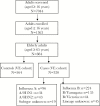The Importance of Frailty in the Assessment of Influenza Vaccine Effectiveness Against Influenza-Related Hospitalization in Elderly People
- PMID: 28931244
- PMCID: PMC5853583
- DOI: 10.1093/infdis/jix282
The Importance of Frailty in the Assessment of Influenza Vaccine Effectiveness Against Influenza-Related Hospitalization in Elderly People
Abstract
Background: Influenza is an important cause of morbidity and mortality among older adults. Even so, effectiveness of influenza vaccine for older adults has been reported to be lower than for younger adults, and the impact of frailty on vaccine effectiveness (VE) and outcomes is uncertain. We aimed to study VE against influenza hospitalization in older adults, focusing on the impact of frailty.
Methods: We report VE of trivalent influenza vaccine (TIV) in people ≥65 years of age hospitalized during the 2011-2012 influenza season using a multicenter, prospective, test-negative case-control design. A validated frailty index (FI) was used to measure frailty.
Results: Three hundred twenty cases and 564 controls (mean age, 80.6 and 78.7 years, respectively) were enrolled. Cases had higher baseline frailty than controls (P = .006). In the fully adjusted model, VE against influenza hospitalization was 58.0% (95% confidence interval [CI], 34.2%-73.2%). The contribution of frailty was important; adjusting for frailty alone yielded a VE estimate of 58.7% (95% CI, 36.2%-73.2%). VE was 77.6% among nonfrail older adults and declined as frailty increased.
Conclusions: Despite commonly held views that VE is poor in older adults, we found that TIV provided good protection against influenza hospitalization in older adults who were not frail, though VE diminished as frailty increased.
Clinical trials registration: NCT01517191.
Keywords: elderly; frailty; hospitalization; influenza; vaccine effectiveness.
© The Author 2017. Published by Oxford University Press for the Infectious Diseases Society of America. All rights reserved. For permissions, e-mail: journals.permissions@oup.com.
Figures


Comment in
-
Test-Negative Design: The Importance of Laboratory-Confirmed Illness in Estimating the Effectiveness of Influenza Vaccine in Older Adults.J Infect Dis. 2017 Aug 15;216(4):399-401. doi: 10.1093/infdis/jix269. J Infect Dis. 2017. PMID: 28931239 No abstract available.
-
Influenza Vaccines for Older Persons: Progress and Pitfalls.J Infect Dis. 2017 Aug 15;216(4):397-398. doi: 10.1093/infdis/jix285. J Infect Dis. 2017. PMID: 28931245 No abstract available.
-
Reply to Skowronski et al.J Infect Dis. 2017 Dec 27;217(1):169. doi: 10.1093/infdis/jix549. J Infect Dis. 2017. PMID: 29045703 No abstract available.
-
Selection Bias in the Assessment of Frailty and Its Role in Influenza Vaccine Effectiveness Evaluation Among Elderly Adults.J Infect Dis. 2017 Dec 27;217(1):168. doi: 10.1093/infdis/jix548. J Infect Dis. 2017. PMID: 29045721 No abstract available.
References
-
- Chan TC, Fan-Ngai Hung I, Ka-Hay Luk J, Chu LW, Hon-Wai Chan F. Effectiveness of influenza vaccination in institutionalized older adults: a systematic review. J Am Med Dir Assoc 2014; 15:226 e1–6. - PubMed
-
- Nichol KL, Nordin JD, Nelson DB, Mullooly JP, Hak E. Effectiveness of influenza vaccine in the community-dwelling elderly. N Engl J Med 2007; 357:1373–81. - PubMed
-
- Rivetti D, Jefferson T, Thomas R et al. Vaccines for preventing influenza in the elderly. Cochrane Database Syst Rev 2006; CD004876. doi:10.1002/14651858.CD004876.pub2. - PubMed
-
- Darvishian M, Bijlsma MJ, Hak E, van den Heuvel ER. Effectiveness of seasonal influenza vaccine in community-dwelling elderly people: a meta-analysis of test-negative design case-control studies. Lancet Infect Dis 2015; 14:1228–39. - PubMed
Publication types
MeSH terms
Substances
Associated data
Grants and funding
LinkOut - more resources
Full Text Sources
Other Literature Sources
Medical

